Have I ever told you how horrible of a cook I used to be?
It was bad, you guys. Really bad.
So bad that when Christian and I got married, my speciality was broiled spam sandwiches. (For realz.)
So bad that it was years before I fed my family pork chops that weren’t reminiscent of corrugated cardboard.
So bad that once I cooked a store-bought corned beef for only a few hours (without added seasonings) and then proceeded to shred it (instead of slice it), which resulted in bright pink strings of chewy, flavorless beef, which prompted Christian to think corned beef was the devil. (Can’t say that I blame him.)
Let’s just say I struggled.
All that to say, if I can end up loving to cook and writing a cookbook 12 years later, then I think there’s hope for pretty much anyone…
Anyway. It was many years before I tried corned beef again after that original incident, but I eventually got back on the horse (ya know, the whole “get bucked off and get back on” thing…) and it was totally worth it.
Nowadays, I make homemade corned beef from scratch to avoid the junk in the store-bought versions, and it’s unbelievably easy. In a nutshell:
- Stick a beef brisket in brine.
- Let said brisket bask in the brine for 5 to 10 days (“brisket bask in the brine” say that 5 times fast)
- Cook the brisket long and slow.
BAM. This one is hard to mess up, folks. Even if you struggle in the kitchen (like my old self).
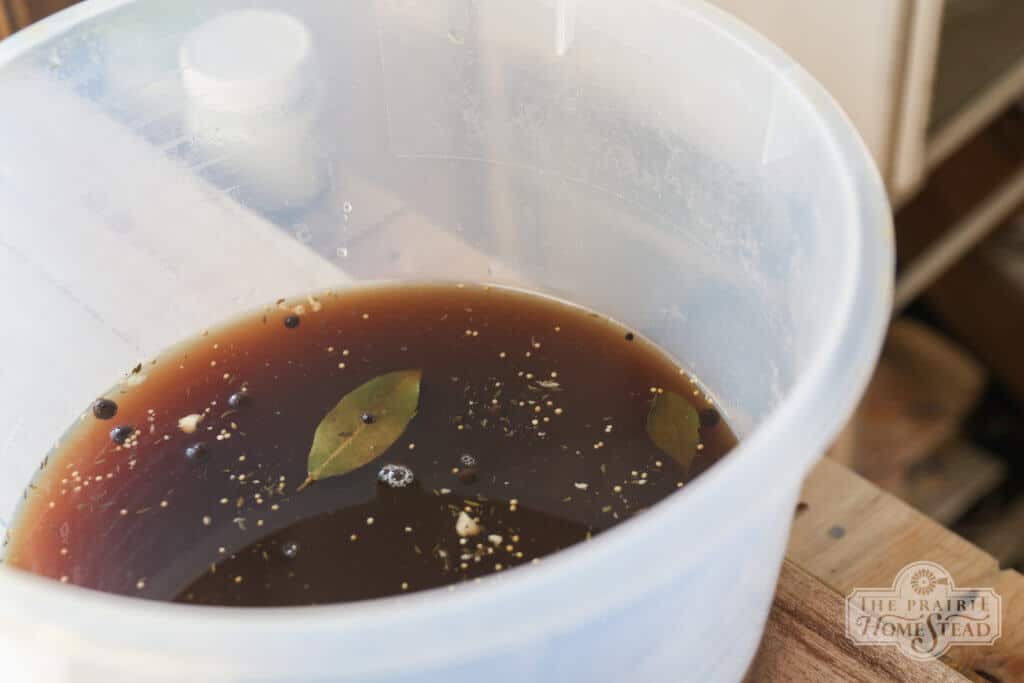
Homemade Corned Beef vs. Store-Bought Corned Beef
First off, you probably already know this, but corned beef doesn’t have anything to do with corn. Shocking.
The “corn” in corned beef actually refers to the large grains (or corns) of salt that are used in the recipe. Makes sense, huh?
Good. Now we’re on the same page.
Corned beef is a salt-cured meat, and it usually contains pink curing salt or saltpeter (not to be confused with kosher salt, pink Himalayan salt, or table salt).
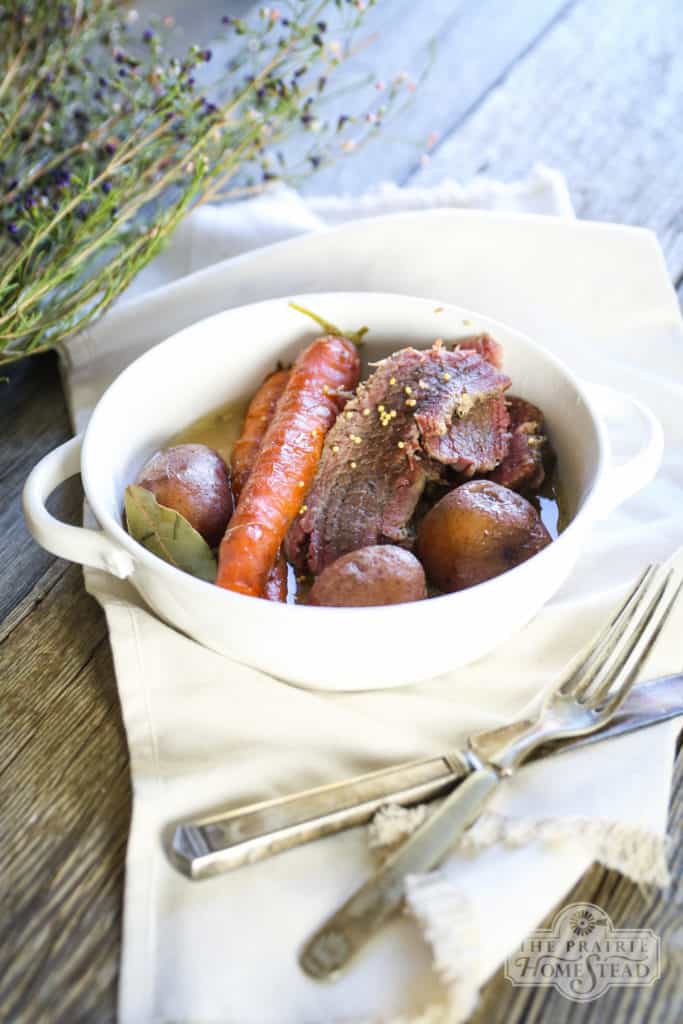
The only downfall I see to *not* using saltpeter in this recipe is that the resulting corned beef will be more brownish (like a typical brisket or roast) than bright pink. But that doesn’t really bother me much.
REVISION: After doing a bit more research, I am recommending that you DO use curing salt (aka prague powder) in this recipe, due to the time the beef is submerged in the brine. Ya know, because botulism. If you want to omit it, that’s up to you. But I will be using curing salt in my corned beef moving forward.
Corned beef reminds me a bit of a good ham– salty and spiced–except it’s made with beef, not pork, of course. Once you try this homemade corned beef recipe with the brine that packs a punch from the mustard, cinnamon, and juniper berries, I have a hunch it’ll become a regular on your table.
(This post contains affiliate links)
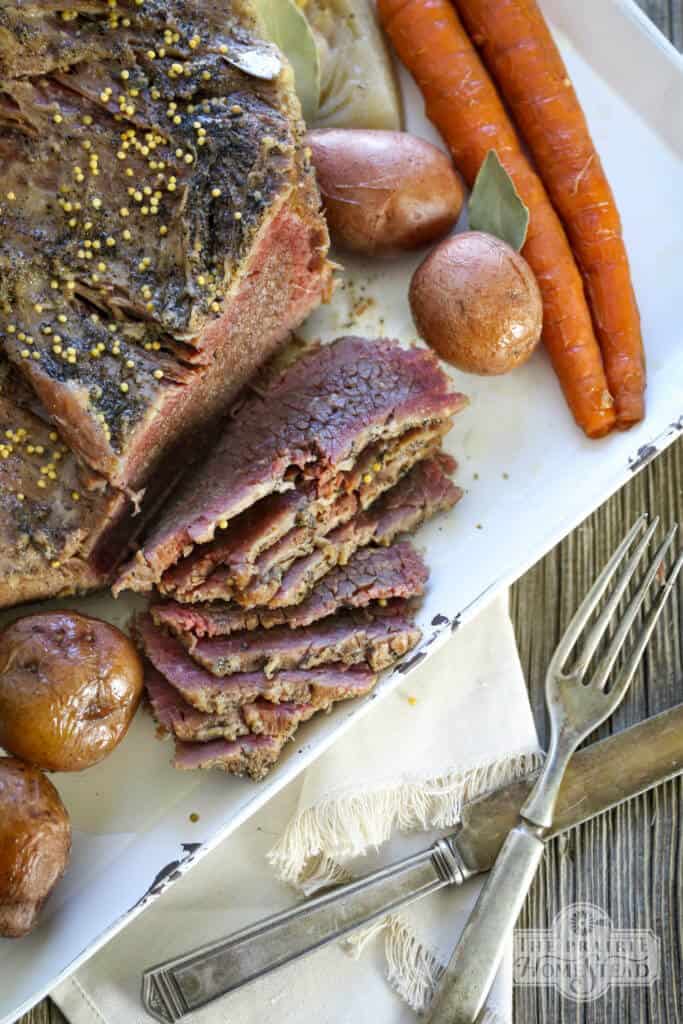
Homemade Corned Beef Recipe
You Will Need:
- 4 quarts water*
- 2 cups coarse salt (use one cup of salt per 2 quarts of water, I use Redmond Salt)
- 1/2 cup unrefined whole cane sugar (like this or regular brown sugar works too)
- 4 garlic cloves, smashed
- 2 tablespoons black peppercorns
- 1 tablespoon mustard seeds
- 1 tablespoon juniper berries
- 1 teaspoon prague powder/curing salt #1 (where to buy- affiliate link)
- 1 teaspoon dried thyme
- 1 teaspoon ground ginger
- 10 allspice berries
- 4 bay leaves
- 1 cinnamon stick
- 1 beef brisket (5 lbs)
*The water needs to completely cover the meat during the brine process, so the exact amount of water required will depend on the size of your brisket and the size of your brining container. Reduce the salt if you use less water (the general rule of thumb is 1 cup of coarse salt per 2 quarts of water).
Place the water, salt, prague powder, sugar, garlic, and all the herbs and spices in a stockpot and bring to a simmer. Stir until the salt is completely dissolved, then set aside to cool.
Put the brisket in a large non-reactive container and pour the cooled brine over the top. The brine should cover the meat completely. If the brisket wants to float to the top, weigh it down with a plate. (I use these large food-grade plastic tubs with lids for brining.)
Let the brisket brine in the refrigerator for 5 to 10 days. The longer it sits, the saltier it will be. If you are in a hurry, you can brine for a shorter amount of time, although the finished product might not be as flavorful.
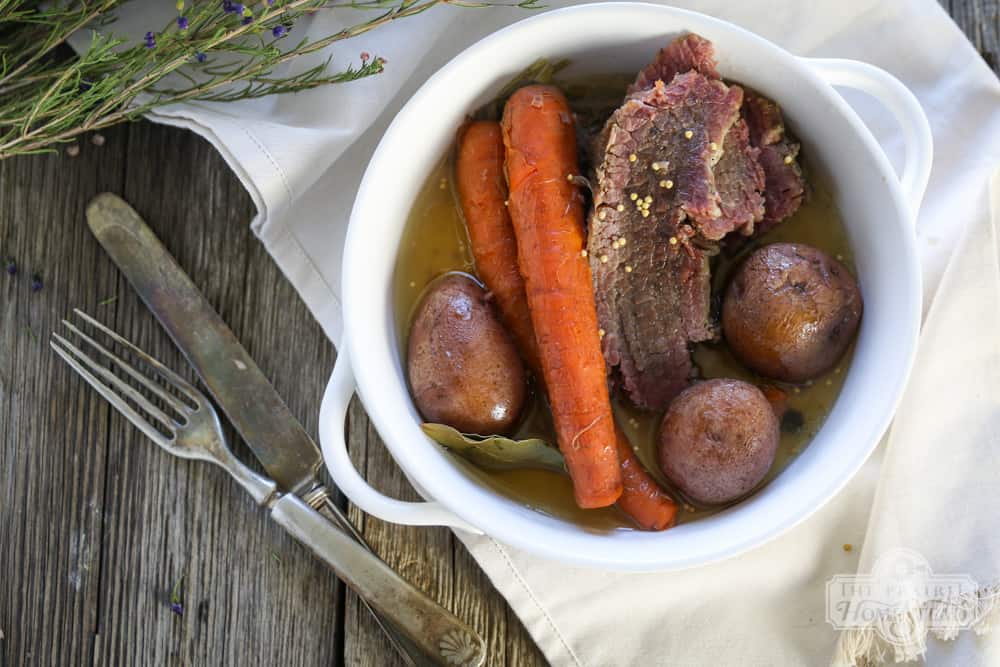
To Cook Corned Beef:
You Will Need:
- 1 brined corned beef brisket (above)
- 1 medium onion, cut into wedges
- 4 cloves garlic, smashed
- 1 teaspoon mustard seeds
- 3 bay leaves
- 6 allspice berries
- 1 teaspoon ground black pepper
- 1/2 teaspoon salt (omit this if your corned beef has been brining the full 10 days or longer– it likely will be salty enough, otherwise, I use Redmond Salt.)
- 1 12 oz beer (stouts or porters are good options)- optional
- 1 pound small red potatoes
- 2-3 cups carrot chunks
Thoroughly rinse the corned beef until cool water– this will prevent the finished product from being too salty.
Arrange the onion wedges and garlic in the bottom of a slow cooker, then place the corned beef on top, fat side up.
Add the mustard seeds, bay leaves, allspice, pepper, salt, and beer. Fill the slow cooker with hot water until the corned beef is almost completely covered. (As it cooks it will sink down a bit.)
Cook on low for 5 hours, then add the carrots and potatoes. Cook for another 2 to 3 hours, or until tender.
Thinly slice the corned beef across the grain and serve with the carrots, potatoes, grainy mustard, and/or cabbage, if desired.
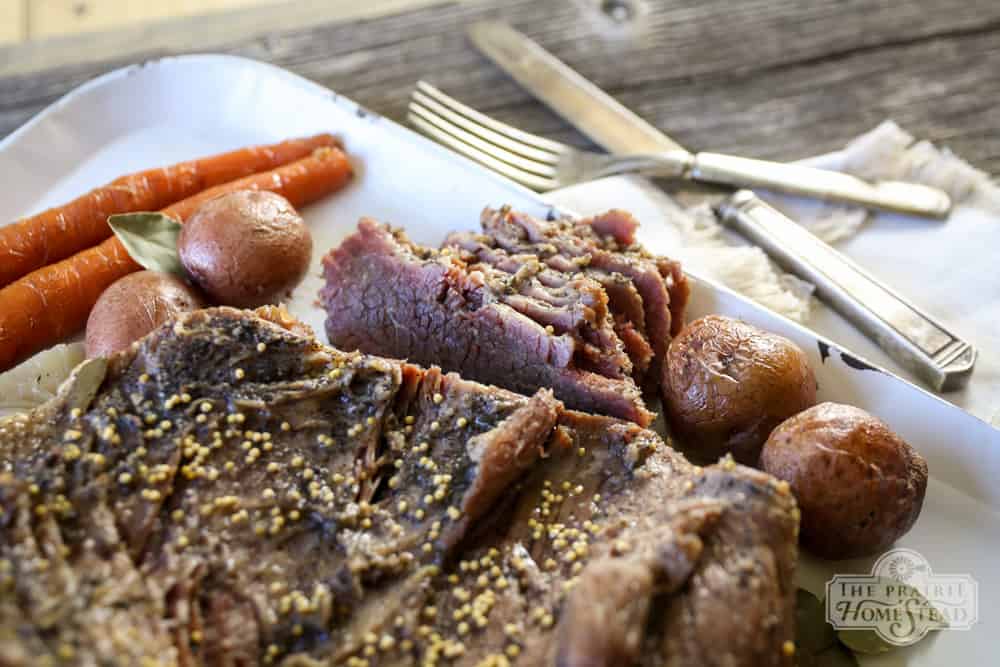
Homemade Corned Beef Notes:
- To cook cabbage in the slow cooker with the corned beef, placed a cored and quartered head of cabbage on top of the beef one hour before the cooking time is complete.
- If you’d rather skip the beer, no worries– just use additional water.
- If you’re missing some of the spices and herbs called for in the brine recipe, it’s not a huge deal. You can omit or adjust quite a bit without hurting the flavor of the finished beef.
- I didn’t have juniper berries when I made my brine, so I used 4 drops of juniper berry essential oil instead.
- If you don’t want to use a slow cooker, add all the ingredients to a large pot, cover, and simmer for 3 to 4 hours on the stovetop until the meat is fork tender.
- Turn leftover corned beef into Reuben sandwiches made with homemade sauerkraut.
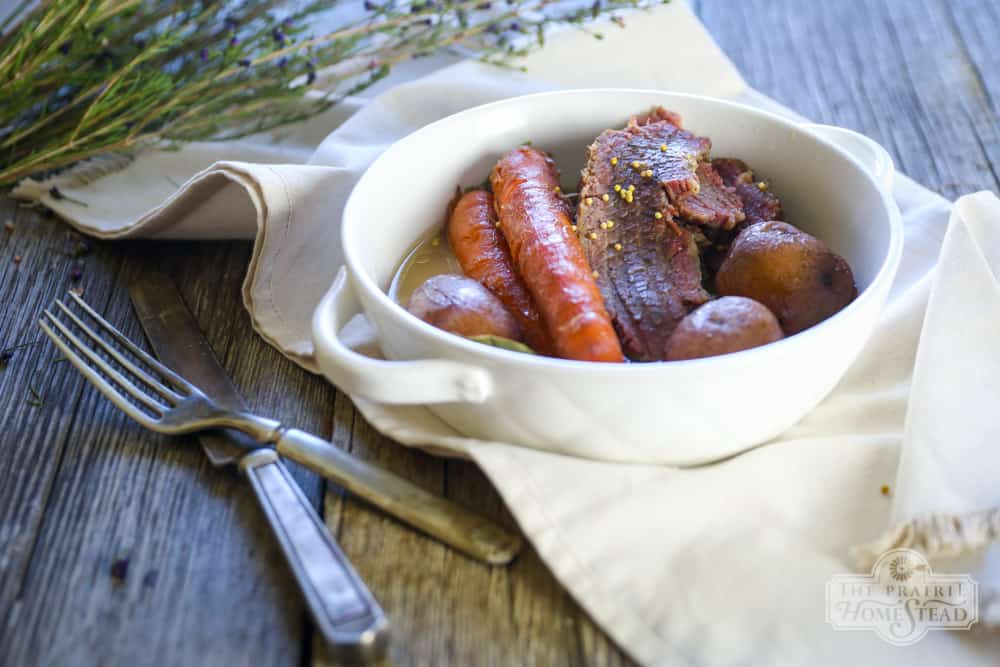
Homemade Corned Beef Recipe
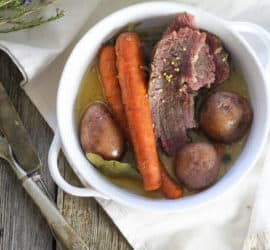
- Category: Main Course- Beef
Ingredients
- FOR THE BRINE:
- 1 gallon of water*
- 2 cups coarse salt (use one cup of salt per 2 quarts of water, I use Redmond Salt)
- 1/2 cup unrefined whole cane sugar (or regular brown sugar works too)
- 4 garlic cloves, smashed
- 2 tablespoons black peppercorns
- 1 tablespoon mustard seeds
- 1 tablespoon juniper berries
- 1 teaspoon prague powder/curing salt #1
- 1 teaspoon dried thyme
- 1 teaspoon ground ginger
- 10 allspice berries
- 4 bay leaves
- 1 cinnamon stick
- 1 beef brisket (5 lbs)
- TO COOK THE BRISKET:
- 1 brined corned beef brisket (above)
- 1 medium onion, cut into wedges
- 4 cloves garlic, smashed
- 1 teaspoon mustard seeds
- 3 bay leaves
- 6 allspice berries
- 1 teaspoon ground black pepper
- 1/2 teaspoon salt (omit this if your corned beef has been brining the full 10 days or longer– it likely will be salty enough)
- 1 12 oz beer (stouts or porters are good options)- optional
- 1 pound small red potatoes
- 2–3 cups carrot chunks
Instructions
- FOR THE BRINE:
- *The water needs to completely cover the meat during the brine process, so the exact amount of water required will depend on the size of your brisket and the size of your brining container. Adjust the salt if you use less water (the general rule of thumb is 1 cup of coarse salt per 2 quarts of water).
- Place the water, salt, prague powder, sugar, garlic, and all the herbs and spices in a stockpot and bring to a simmer. Stir until the salt is completely dissolved, then set aside to cool.
- Put the brisket in a large non-reactive container and pour the cooled brine over the top. The brine should cover the meat completely. If the brisket wants to float to the top, weigh it down with a plate. (I use these large food-grade plastic tubs with lids for brining.)
- Let the brisket brine in the refrigerator for 5 to 10 days. The longer it sits, the saltier it will be. If you are in a hurry, you can brine for a shorter amount of time, although the finished product might not be as flavorful.
- TO COOK THE BRINED BRISKET:
- Thoroughly rinse the corned beef with cool water– this will prevent the finished product from being too salty.
- Arrange the onion wedges and garlic in the bottom of a slow cooker, then place the corned beef on top, fat side up.
- Add the mustard seeds, bay leaves, allspice, pepper, salt, and beer. Fill the slow cooker with hot water until the beef is almost completely covered. (As it cooks it will sink down a bit.)
- Cook on low for 5 hours, then add the carrots and potatoes. Cook for another 2 to 3 hours, or until tender.
- Thinly slice the corned beef across the grain and serve with the carrots, potatoes, grainy mustard, and cabbage, if desired.
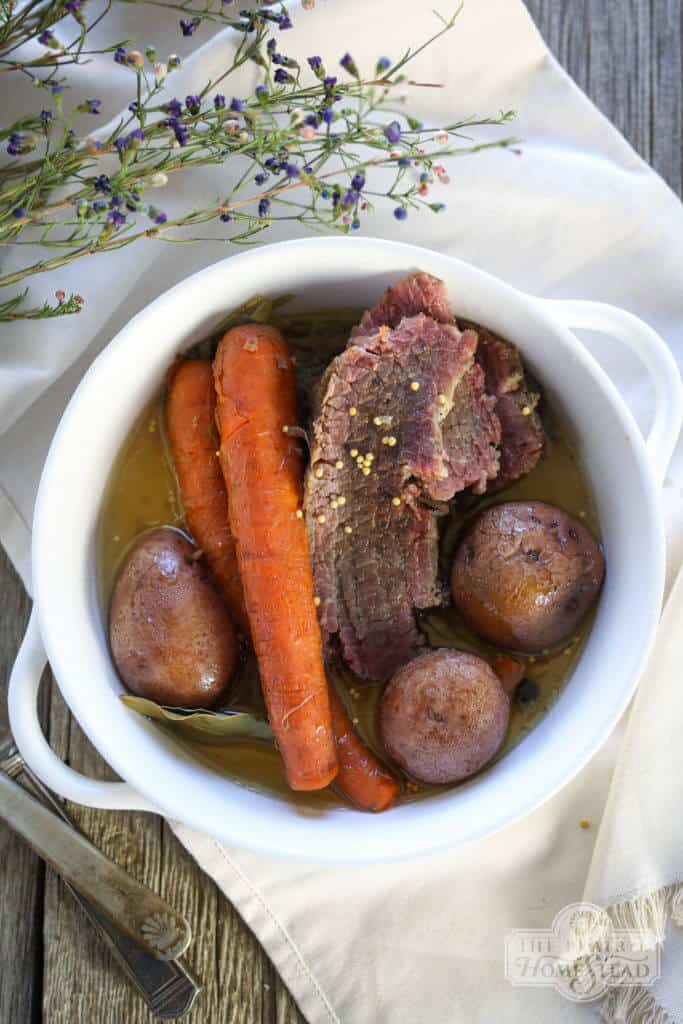
More Beef Tips & Recipes:
- Love beef? Check out my Cooking Through the Cow ebook for tons of tips and recipes for cooking different cuts of beef.
- Slow Cooker Beef Roast with Sweet & Salty Sauce
- Cheeseburger Salad Recipe
- How to Cook Short Ribs
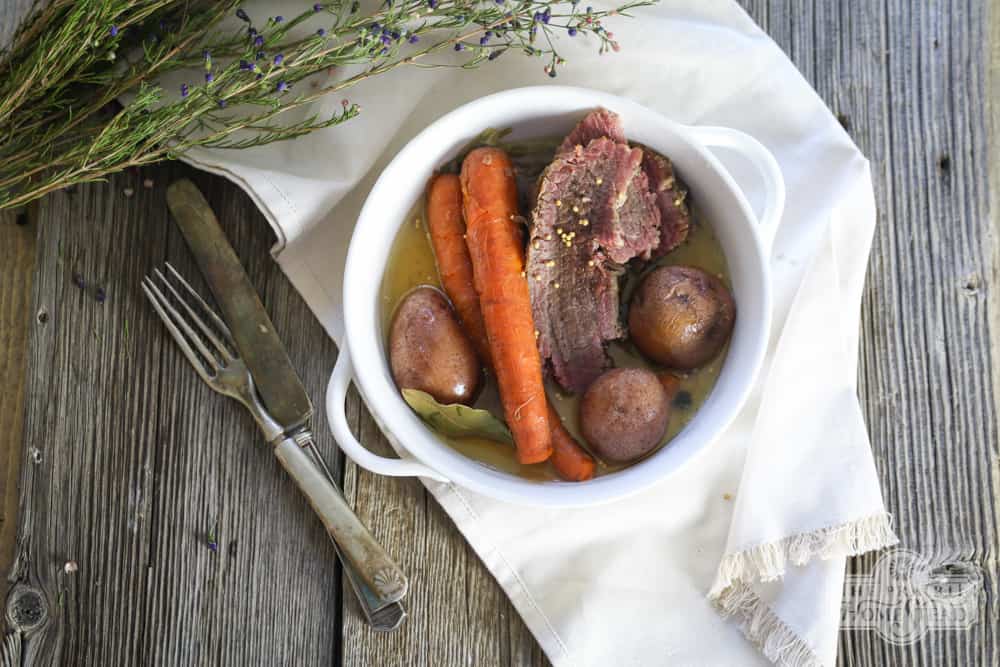

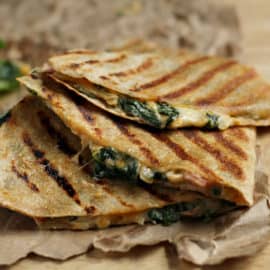
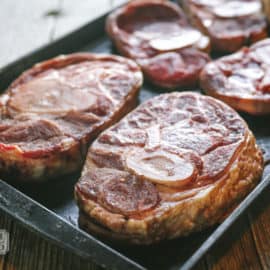

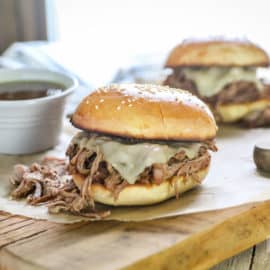
I’ve never liked commercial corned beef, but you make this sound tasty and easy, so I think its worth a try!
My Grandmother immigrated from Ireland in the early 1900’s. She always made corned beef on Sundays after church. Monday was always my favorite dinner. We took the leftover potatoes and carrots and mashed them and mixed in the shredded beef and made hash! Hash fried crisp with over easy eggs can transform me into a 6 year old in an instant! Thank you for the memories!
You sound like I did 43 years ago this August. Knew how to make breakfast (my mom didn’t cook breakfasts) but nothing else until I learned to make spaghetti. We had spaghetti for a long, long, time until one night hubby (worked night shift at a mill) drove to work with the spaghetti on his windshield. The guys thought he had hit something. Yep, he did, my wrath! LOL!! But I got the hint, and learned to cook. Love your webpage and emails btw.
Oh my word– the the mental picture of that is hilarious!
What is Prague powder and where w would I find it?
If you read the post, prague powder is described as a curing salt that is necessary to avoid botulism. You could buy it online wherever you want, however, we did include a link to an option for you in the recipe. 🙂
Curing salt #1 has nitrates. What can Iuse to avoid nitrates?
Sounds like a delicious tradition and memory!
Jill; this is not in response to the recipes but I don’t know how to reach you. Trying to sign up for the preview but it will not take my email; I tried to send you a mssg about it several days ago but had not heard back so tried again with same results. Would like to see the crash course next wk somehow.
What are juniper berries and where do I get them?
Could you replace juniper berries with something else ? I am very allergic to juniper.
You can just omit them if you like.
They are from the juniper tree plant– you can get them at many health food stores or online.
I cook my corned beef on the stovetop; chop up an onion, throw in a dozen whole cloves and 2-3 cloves of garlic, add water to cover and simmer at least 5 hours. Add carrot chunks, small red potatoes and cored/quartered cabbage and cook until the potatoes and carrots are done.
Also, I eat my corned beef with a sauce made of ketchup and horseradish (like cocktail sauce).
I like your recipe and will give it a try this year.
Thanks for sharing.
Ray
Sounds pretty tasty to me Ray!
Sometimes I read things sideways so just to clarify – I add spices to the brine then additionally I add them to cook in, correct? So basically I need double spices – half for each recipe? (I haven’t checked if they’re identical, but it looks like basically you brine in a batch of spices then cook in a second batch of the same spices… is that right?)
Yes– the brine has spices/herbs, and then you add additional herbs when you cook it. They are not identical, so definitely checked the recipe before you make it.
We just canned (raw pack) our homemade corn beef with chunks of organic potatoes and chunks of the brisket. When ready to use, drain the broth, put the meat and potatoes on a cutting board and chop up! Absolutely the best hash we have ever eaten!
Ooooh, that sounds amazing!
Sounds wonderful! Don’t know if I’ll have time to make it before St.Patrick’s Day, but I’ll do it for our next corned beef day. Corned beef is a family favorite around here.
Talking about bad cooking failures. A few years ago I made a carrot cake and for some reason I accidentally added a horrendous amount of cinnamon to the recipe. The cake was soooooo bad that even my chickens wouldn’t eat it. Seriously! My entire flock would not touch it and this was the same flock that I had caught eating dog poop once! Our whole family still laughs about “The Cake”. Luckily, it only happened that once, but now when I make a carrot cake everyone always asks if I checked the amount of cinnamon.
“corned beef day” i like the sounds of that! 😉
Nitrates and nitrites are grouped into the GMO syndrome. People are sure they want to avoid them, but haven’t got the slightest idea why.
When you ask someone who has cured many hundreds of pounds of pork and beef what they think about nitrates you will learn about botulism. Avoiding a product that reduces the chance of botulism, mostly because it is currently fashionable not to use it, is a risk I would avoid.
Of course you will also have to give up celery …
Like anything, nitrates/nitrites are a topic with a lot of debate and different opinions. We still consume them, but I also don’t mind (safe) recipes where I can omit them.
Some of us have allergy to nitrates/nitrites…severe stomach and intestinal distress…sulfites/sulfates even worse, cant even have a glass of wine, or use shampoo, so!…learning to cook or replace food or soaps etc….for people like me is awsome opens a new world, instead of feeling leftout!….and when it turns out really well and you can show others, just cuz its good!….well thats nirvana….heaven lol….Pat
Sounds like a Newfoundland Jiggs Dinner to me
We just ate this for dinner tonight — an early St.Patrick’s Day celebration. WOW! It was so good. I have never made corned beef before and my kids have never had it because I did not want to buy the pink stuff from the grocery store. I can’t believe how easy this recipe was. Thank you!! The whole family loved it!
Oh yay! This makes me so happy! I’m glad it was a hit!
How long did you brine it for?…sometimes i find it too salty, but i have not tried to brine my own before. I did one brined already , once following recipe presented by my pressure cooker recipe book, a can of beef broth?….was way too salty…..i couldnt eat it….but did pressure cook for hr 90 and liked the tenderness of the meat….the next try, same pressure cooker, same 90 min, but!! Done with henry winehardts stout, it was delish!, next time im gonna make this recipe and throw a porter in there see how she goes!….thanks for the recipe!
Thank you for the recipe! I have one of “those” questions. What would be the best substitute for brisket? We get a whole steer from a local farmer, but there is no brisket in the cuts. I have Chuck and arm roasts, rump roast, round steak, sirloin steak, and ribeye and t bone steaks. Maybe a round steak?
I have made corned beef many times from an old recipe book. The brine is very similar, but it does not contain the “pink salt.” The recipe requires 36 hours of brining on the countertop (no refrigeration). The brine prevents spoilage and the resulting cooked corned beef is amazing.
I would love that recipe! I don’t want the “pink curing salt”, that’s why I have not made this recipe. Can you please share your recipe?
Jill, thank you for your delicious recipes. You are quite an inspiration!
I am trying to remove sugar from my diet. Omitting the sugar, will it charge the flavor dramatically? Substitutions?
What is the serving size and the nutritional values of the corned beef and cabbage recipe?
The curing salt you recommend has nitrates in it. Please change your title! I read the whole thing looking for a nitrate-free solution, and ended up finding out this isn’t what you said.
maybe he does’t know what prague powder is.
Don’t worry about botulism, provided it will be cooked, and that no infant less than one year old will be eating it. With botulism only the toxin is of concern (not the bacterium or it’s spores), and the toxin is readily broken down by boiling. Normal cooking will denature the toxin. The spores may remain but will not make anyone sick, except possibly a baby one year old or younger since botulism spores in honey are known to affect infants one year old or younger.
Cindy
Yes, that was puzzling me too. It is usually said that botulism is usually only a problem if it grows in food post-cooking, for exactly that reason (i.e. the toxin is one of those that breaks down if heated enough). But then, half the food preserving web seems to be in a mad panic about botulism, and the other half doesn’t seem to have heard it exists. And most of the latter don’t seem to be dead :-S. Of course, the way risk works, with something that can kill, there could be a higher risk than you’d want to take and you’d still get away with it most of the time. I wouldn’t want what I’ve prepared to have a 1/1000 risk with botulism, but at one bad jar in a thousand you could still easily can 10 jars for fifty years and still not have had a bad jar.
Hello Jill! How are you doing this week? Down here in the desert it’s raining a lot this week. Did you know that corned beef is not a St. Patrick’s Day tradition in Ireland? Most cattle raised in Ireland are dairy cows. (Kerrygold butter has been rated #1 in the world by culinary experts.) They will usually serve roasted pork, lamb, or mutton. Corned beef became popular with Irish immigrants to the US because it was cheap and they were very poor. Some years I will have roasted leg of lamb with potatoes, onions, and carrots roasted with the meat. Mint jelly. And Yorkshire pudding! Other years it’s Mutton stew and fry bread—-Dine (Navajo) style! But my husband’s favorite way is when I buy a brisket, put a dry rub on it and smoke it for 18 to 24 hours.
I don’t have any brisket in my freezer, but do have some thick cut round steak (2 inches thick). Could I use that instead?
Any idea if one could use ground beef? Or what the result would be if using it? Would appreciate some input
Hey Jill,
thanks for the recipe. I just wanted to point out that Prague powder contains sodium nitrate. Also, people should be careful not to use it directly, as it is toxic.
Thank you!
Cheers,
Albert
Do you have to use that much salt to make this? My husband is on a low-salt diet and I try to avoid lots of salt.
I try to limit my sodium intake and usually buy the low sodium corned beef at the store. Do you think it would be safe to reduce the salt by half?
Jill Winger, I have a streak of brown, like regular cooked meat, in the middle of my corned beef. The brisket was doubled over in the brine and the brine completely covered the meat for 16 days. Is it safe?
I have a whole brisket that is almost 15lbs. I would like to bring the whole thing for corned beef but was wondering if I need to triple the recipe or only parts of it.
You should fix the ratios of the ingredients to be safe.